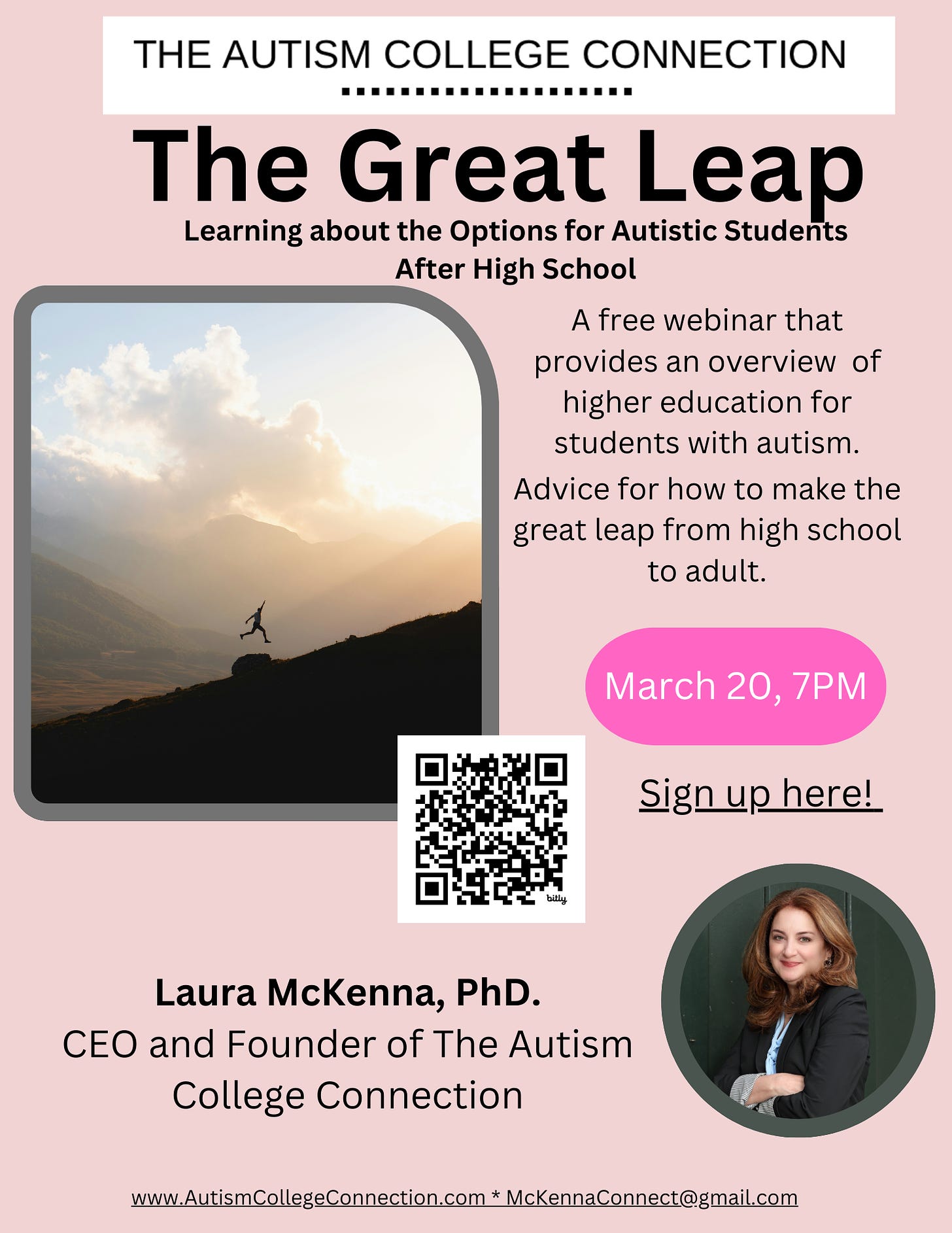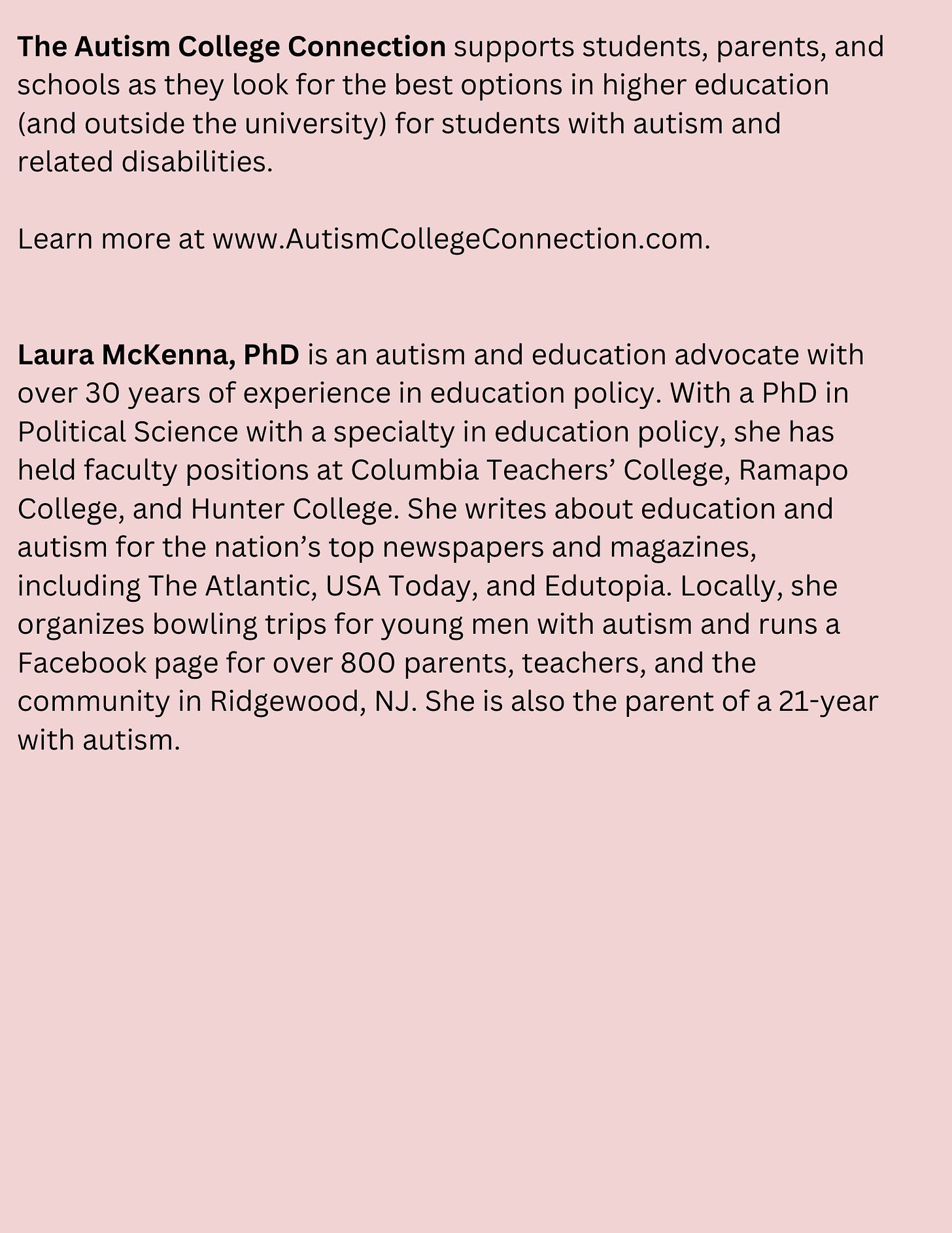The past two months have been a blur. I’m simultaneously preparing Ian for life after high school and building up a new venture at the same time. The good news is that it all overlaps. It’s a culmination of three years of work.
When my son left high school three years ago, I had no plans for him, no idea what should come next. He was too smart for day programs aimed at young adults with higher needs. He had too many medical issues and autistic quirks to work a minimum wage job. He had too many talents that needed cultivation.
But I had no help in figuring out what to do with him. The supports that typical students get for free at the local high school did not exist for me or my son.
So, I did what I always do when faced with a monumental problem. I researched the hell out of it. I wrote about this process a little bit here, but much more was going on behind the scenes. I talk about my journey in my cornerstone webinar for my new company: The Autism College Connection. Feel free to sign up. It’s free.
I’m doing a bimonthly newsletter and sharing info on Facebook, which now has 1,200 subscribers. You can get the links for all that on my webpage. This week, I’m setting up the next two webinars and updating the resource page of the website.
I’m going to continue to provide blog-style info about our personal journey here, and, in addition, I’ll share more polished advice on a subscription basis. More info soon.
To maintain all this work and to mitigate our costs, I will charge parents for webinars and other information starting in the fall. Right now, everything is free while I build up mailing lists and connections.
There are groups that provide information to disability parents. I’ve certainly watched a ton of webinars and gone to too many local events. But I found that I quickly knew more about options and resources than the so-called professionals. I knew I could I explain things better. Other parents figured out that I knew stuff, and started calling me to ask for help. So, damn it. I created my own space, hung my shingle, set up shop. And it’s awesome.
Not only am I a disability and education expert giving out information to parents, but I’m also an autism parent setting up my kid for life after high school. Doctor and patient at the same time.
Things are going well. Ian made enormous strides in the past year. He can talk about his emotions and has a longer social battery. His OCD tics, which posed a serious hinderance to independent living last year, have almost gone away. He might go away to a summer program to live in a dorm for a month this summer.
We’re not entirely sure why Ian made such significant strides. Were his medical issues at the heart of his problems? Did all the therapy that we did this year pay off? Is he outgrowing those issues? We have no idea. All we know is that we are way more optimistic about his future than we were a year ago.
I’m booking him up with a summer college program. After that, he’ll take computer classes at the local community college and work part time at some electronics store. Well, that’s the plan. We’ll see how things go.
More soon.






I am a big fan of your blog and applaud your work with your son and your new business. I'm sure many will benefit. I take issue, however, with the way you described day programs, "He was too smart for day programs that babysat young adults with higher needs." My daughter is also smart. She is quirky and interesting. She has travelled the world with me and wants all those things typical young adults want. She also needs a day program that offers her instruction, community and some fun. The staff at her day program engages with her, fosters relationships and expands the worlds for their clients. To reduce what day programs do to "babysitting" hurt to read. I expected that you understood. It is both disrespectful to my daughter and others who need day programming, and it further silos the larger community of people with disabilities. I believe we need to stand together, cheer on each other, support the needs of all of our children and young adult, not just those in our own children's niche. If we don't support and respect each other, how can we expect the typical world to ever understand and support our children?
Thank you so much for your Substack and your new venture! My husband and I are raising our 13 year old Autistic grandson and I will be following your work for help in the coming years. Our grandson while Autistic, is developmentally disabled but not deemed intellectually disabled. So far we have found that many resources in our area seem more focused on those with Autism who are intellectually disabled. Finding this is like finding water in the desert.